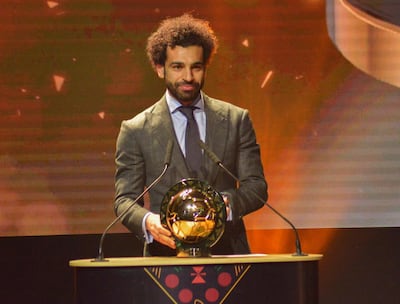It had been a long time waiting, but Egypt on Tuesday finally had their comeback on South Africa for the big result that went against them, back in 2004.
In that year, the Fifa vote for the hosting rights to Africa’s first opportunity to stage a World Cup, the 2010 edition, swung emphatically the way of the continent’s southern tip, with 14 in favour of a bid headed by Nelson Mandela, and no votes for the one supported by, among others, Omar Sharif.
A decade and a half later, the pendulum tilted dramatically. The executives of CAF, the Confederation of African Football, cast 16 votes in favour of Egypt’s hosting the 2019 African Cup of Nations (Afcon). A single delegate chose the rival, South Africa.
__________
Read more:
WATCH: Salah performs cringe-worthy dance after accepting award
Egypt beats South Africa to host 2019 Africa Cup of Nations
Al Mubarak and Salah among winners of Mohammed Bin Rashid Creative Sports Award
__________
So Egypt, with barely five months notice, will organise and stage the most expanded Afcon ever staged, with 24 nations competing, up from the previous template of 16.
The party-giver, as is becoming customary, will have to get its act together fast. For the fourth Afcon in succession, the originally assigned host has not been able to honour the responsibility, Cameroon the latest to fail to meet the deadlines and fulfil the undertakings they signed up to.
CAF were relieved that two heavyweight countries had offered to step in as late back-ups, and chose Egypt, informed sources indicate, because the willingness of government in Cairo to pick up the bill for the June and July showpiece was more firmly expressed than it had been in Pretoria, where accepting an Afcon late - as South Africa did when war in Libya meant a change of venue in 2013 - is viewed as a mixed blessing.
South Africa, with its many fine stadiums, its developed infrastructure, its success as hosts of the 2010 World Cup will doubtless be asked again to take on an Afcon because CAF are acutely aware there are only a limited number of countries with the capacity to stage a 24-team jamboree, and that Cameroon, now in line to stage the 2021 event, have fallen short of standard once and may fail again.
Egypt has the venues, evidently has the deep-rooted football culture, and it has experience in staging an event that gathers the concentrated interest of the vast continent like no other.
This will be its fifth time of hosting, and if there is a sense of symmetry in that the first was 60 years ago, to look back to the 1959 edition is to be reminded the tournament has suffered a case of extreme elephantiasis since then: a mere three countries took part in the three-match, single-stadium week-long 1959 Afcon, Egypt finishing ahead of Sudan and Ethiopia.
The 2019 Afcon, by contrast, will annoint its champion in Cairo after 51 matches, spread over as many as eight possible arenas in five cities: the capital, Alexandria, Ismailia, Suez and Port Said, to where the return of elite international football will feel especially poignant.
In February 2012, 74 spectators lost their lives after rioting at the Port Said stadium during and after a match between Al-Masry and Al-Ahly. After that tragedy, the Egyptian league shut down for the best part of two years, and effectively kept supporters out of domestic matches until last year.
“Fans will back in the stadiums which I promise will be full,” said Ahmed Shobair, vice-president of the Egyptian Football Association, which now takes a large share of responsibility for delivering a government-backed message that Egypt is safe, welcoming and efficient.
They have a fine global ambassador, Africa's best current player, Mohamed Salah, who will now find himself leading one of the favourites to win the title.
In 1986 and 2006, Egypt were both hosts and champions. Their football status, having put together a hat-trick of Afcon gold medals up until 2010, was then affected by political upheaval in the country and the post-Port Said damage to the league.
Egypt failed to qualify at all for the next two editions, but, inspired by Salah, reached the final in 2017 and later that year qualified for their first World Cup since 1990.
A fit Salah will be key to Egypt’s ambitions. A compelling tournament is as crucial for CAF, who have not only enlarged the Afcon but took the decision to relocate in the calendar, from its former January-February slot to June and July, where this summer it will be competing for global broadcast audiences with the Copa America, taking place simultaneously in Brazil.
In Egypt at that time of the year, temperatures will be high, potentially sapping for players coming off long domestic seasons.



